How what you eat affects your sleep
Not getting enough sleep can devastate your body, brain and gut, and dramatically increase your risk of obesity, diabetes and dementia. Here’s why what you eat could be the key to a good night’s sleep.
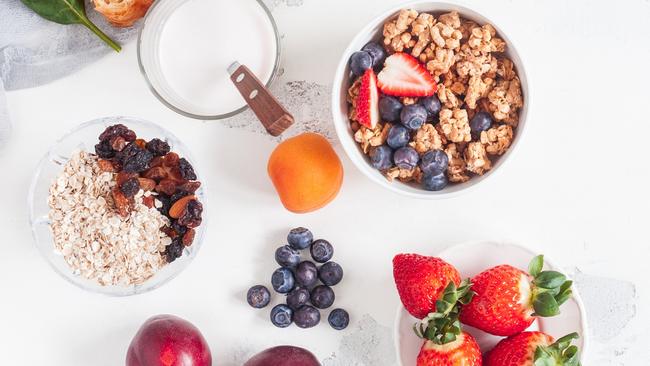
Lifestyle
Don't miss out on the headlines from Lifestyle. Followed categories will be added to My News.
Thanks to recent research, we know that too little sleep can devastate your body, brain and microbiome (gut bacteria), dramatically increasing your risk of developing a range of chronic conditions such as obesity, type 2 diabetes and dementia.
The reason I particularly wanted to write this book is because I am obsessed by sleep and have been for many years, not just from a science perspective, but also on a deeply personal level.
For the last 20 years, I have suffered quite badly from intermittent insomnia, to the point where I was in real despair. I wanted to find out what I was doing wrong and, of course, I wanted to find out what I could do to make it better.
****
A few years ago I wrote a book called The Clever Guts Diet, about the impact that the food we eat has on our microbiome, the trillions of microbes that live in our guts. The book included recipes and advice, shown to boost the good bacteria and minimise the bad. Improving your microbiome can help you lose weight, boost your immune system and improve your mood.
Since I wrote that book, there has been lots more research into the impact of food on mood, including some that has looked at the effect that specific foods have on our sleep.
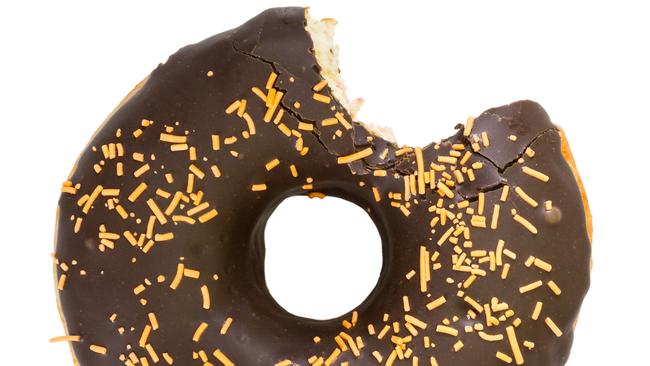
For example: An experiment carried out by researchers from the Institute of Human Nutrition in New York showed for the first time that feeding volunteers a diet rich in fibre and protein led to more deep sleep, while getting the same volunteers to eat foods rich in sugar and simple carbs led to more fragmented sleep.
Another study, from the same group, which looked at the diet and sleeping patterns of more than 2200 people across America, found that those with a high M score (how Mediterranean your diet is) slept longer and better than those eating a more typicalAmerican diet.
A study published in 2017, carried out by Professor Felice Jacka, director of the Food & Mood Centre in Melbourne, Australia, showed for the first time that putting people with moderate to severe depression on a Med-style diet led to such big improvementsin mood that many were no longer clinically depressed.
In a more recent study, published in October 2019, researchers from the US showed that people who have higher levels of certainmicrobes in their guts, particularly those from the phylum Bacteroidetes, enjoy deeper, more efficient sleep and less wakingat night than those with lower levels.
Let’s start with my favourite way of eating, the Mediterranean diet, the traditional diet of the countries that border theMediterranean Sea. I have been a huge fan ever since I discovered that it is not only super-tasty but also has a wide rangeof health benefits. Studies have shown that eating a Mediterranean diet will: Cut your risk of having a heart attack or strokeby around 30 per cent; cut your risk of developing type 2 diabetes by 5 per cent; cut your risk of developing breast cancerby up to 70 per cent.
The traditional Mediterranean diet involves consuming lots of olive oil, nuts, oily fish, fruit, veg and wholegrains. Youalso eat reasonable amounts of full-fat yoghurt and cheese, as well as a glass or two of red wine with the evening meal. There is not much room in this diet for cakes, biscuits or highly processed food.
Although most of the research looking at the Mediterranean diet has focused on its impact on reducing heart disease, cancer, dementia and diabetes, in the last couple of years there have been a couple of big studies published in reputable journals, looking at its effect on sleep.
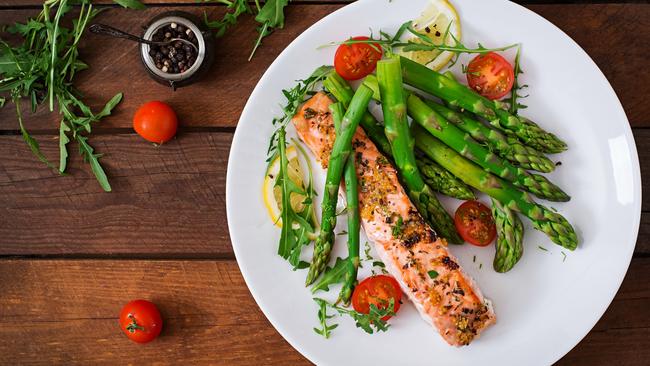
In May 2019, for example, a study in Italy looked at the link between what Italian adults are eating and how well they are sleeping. For the MEAL study, researchers collected data from 1314 men and women living in Catania, one of the largest cities on the island of Sicily.
The researchers took detailed records of what the participants ate and then used the results of their completed food questionnaires to divide them into four groups, based on their M score, ranging from low to high Mediterranean diet adherence.
The participants also filled in the Pittsburgh sleep quality index. When the researchers compared what they ate with how well they slept, they found that those with a high M score were more than twice as likely to enjoy decent-quality sleep as those with a low M score. They not only slept longer, but they had a higher sleep efficiency and were less likely to have a disturbednight.
Interestingly, this was true only for those who were a healthy weight, or a bit overweight. The men and women who were obese (with a BMI over 30) were not protected from poor sleep by a healthy diet.
These findings were replicated by another big study that looked at the links between diet and sleep in more than 2000 middle-agedmen and women in the US. Again, there was a clear link between participants’ M score and how well they slept.
The problem with observational studies, like the two I’ve just described, is that you can never be entirely sure of the extentto which it is a good diet that leads to better sleep, or vice versa. As I pointed out earlier, when people are sleep deprivedthey tend to eat more junk food.
That’s why I was pleased to come across a novel intervention study conducted at Cornell University in New York, in which theresearchers manipulated the subjects’ diet and then saw what effect that had on their sleep.
For this study, they asked 26 adults – 13 men and 13 women – to spend five nights in a sleep lab, wired up to machines sotheir sleep could be monitored in detail. During this time, the participants ate meals that contained varying amounts of fat, protein, carbs, fibre and sugar.
It turned out that when they ate meals containing more saturated fat, carbs and sugar, they had lighter, more disrupted sleep. But when they ate meals that were richer in protein and fibre, they got to sleep faster and spent more time in deep sleep.
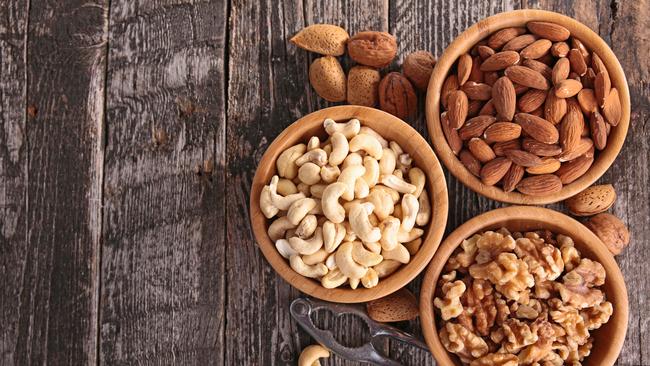
There are a number of reasons why eating a Med diet helps sleep. These include the fact that:
1. The foods in this diet, like olive oil, oily fish, legumes and vegetables, contain anti- inflammatory compounds, such asoleic acid, omega-3 fatty acids and polyphenols. We know that inflammation leads to arthritis and other painful conditionsthat keep people awake at night. We also know that neuroinflammation (inflammation of the brain), which becomes more common as we get older, contributes to poor sleep and dementia.
2. Going on a Mediterranean diet boosts levels of the “good” bacteria in your gut – these in turn can produce powerful anti-inflammatoryagents, as well as “feel-good” chemicals which reduce anxiety. Since one of the main reasons people stay awake at night is because they are ruminating and fretting, anything that improves mood is likely to be good for sleep.
****
You have one to two kilos of microbes, the weight of a large bag of sugar, living in your gut. The 100 trillion microbes thatlive down there are known as the gut microbiome, and there are as many of them living in your large intestine as there arecells in your body.
Now we know the microbiome also: Influences our body weight by shaping our appetite and cravings, and deciding how much energyour body extracts from the food we eat. Can your microbiome make you fat? It certainly can.
Teaches our immune system how to behave. If you don’t have the right sort of microbes in your gut, you are at much greaterrisk of a range of allergic and auto-immune diseases, from asthma to multiple sclerosis.
Last, it has a big impact on our mood and our sleep, so much so that the study of how the creatures in our guts affect ourbrains has its own name, “psychobiotics”.
Some of them can take the bits of food our body can’t digest (such as fibre) and convert it into hormones that influence ourmood – hormones like dopamine, serotonin and GABA (a neurotransmitter that acts in a similar way to the anti- anxiety drugValium).
Others can turn fibre into a chemical called butyrate, which is brilliant at damping down inflammation. Chronic inflammation is behind a whole range of diseases, including cancer and heart disease.
We know that having a narrower, less diverse microbiome is associated with a range of chronic diseases, including a higherrisk of obesity, inflammation, type 2 diabetes, colorectal cancer and allergies.
Sadly, the microbiome tends to become lessdiverse as people grow older. This is partly because people tend to eat a narrower range of foods as they get older and partlybecause they eat more “convenience” foods, which are highly processed and often contain emulsifiers, which are added to extendthe food’s shelf life. Your microbes do not enjoy them.
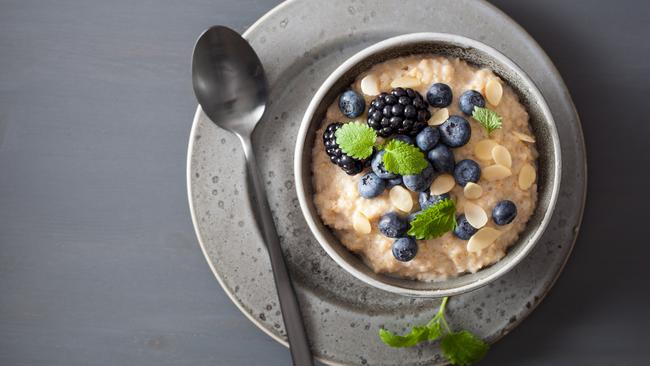
By the time most people are in their sixties, healthy microbes, like Lactobacillus and Bifidobacterium, have begun losingground to pro-inflammatory, opportunistic bacteria, that can cause an infection when given half a chance. Older people alsotake more prescription drugs, which can play havoc with the microbiome, and they do less exercise, which again reduces microbiomediversity.
There’s good evidence that people who manage to keep their gut garden in good shape as they age not only develop less chronicdisease but also sleep more soundly.
An edited extract from Fast Asleep by Dr Michael Mosley, Simon & Schuster, $??, Out now
WHAT TO DO:
Changing what you eat and when you eat can help you to sleep better:
•Try not to eat within three hours of bedtime.
•Experiment with extending your overnight fast to 12 and then 14 hours.
•Cut back on sugar, sugary treats, drinks and desserts, particularly shop-bought ones. They lead to more fragmented sleep.
•Get more fibre into your diet by switching to brown rice, and by eating more quinoa, bulgur, whole rye, wholegrain barley, wild rice, buckwheat, lentils and beans.
•Porridge oats are great for breakfast, as long as they are not the processed instant sort.
•Full-fat yoghurt is a good source of probiotics.
Add blackberries, strawberries or blueberries for flavour. Or a sprinkling of nuts.
•Snack on nuts: they are a great source of protein and fibre, which should lead to more deep sleep. Try to avoid salted or sweetened nuts, which can be more-ish.
•Eat oily fish such as salmon, tuna and mackerel, which are rich in omega-3 fatty acids, two to three times a week. An experiment conducted with American prisoners found that eating oily fish can improve sleep.
•The best fruits to give your biome a treat are berries, apples and pears.
•Have an alcoholic drink, if you must, but only with your evening meal. Try to average no more than a glass a day and try sticking to red wine, which studies have shown is better for you than white.
READ MORE:
SHOCK HABITS OF AUSSIE SHOPPERS REVEALED
